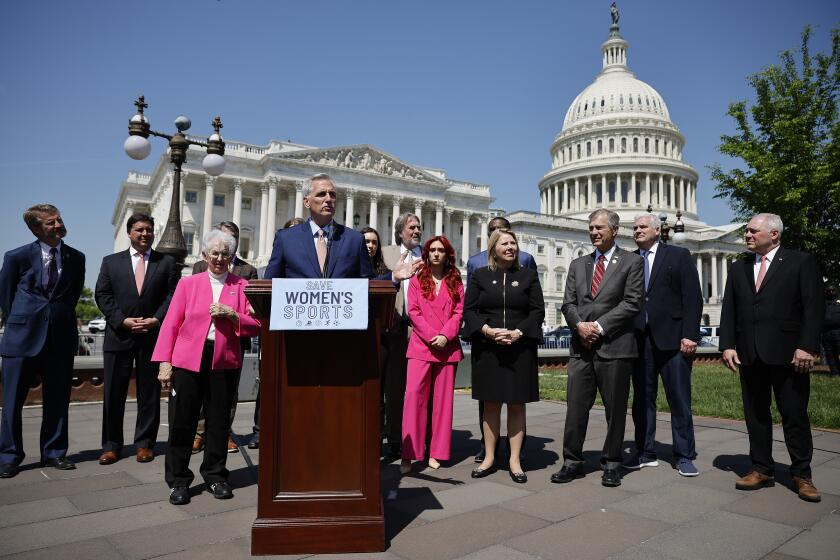
The San Jose State women’s volleyball team picked up its fourth victory by forfeit Wednesday, three weeks before the match was scheduled to be played and one day before losing on the court for the first time this season.
The reason for the unusual sequence of events is straightforward: San Jose State has a transgender athlete on its roster, and four Mountain West Conference opponents have chosen to take losses rather than take the court against the Spartans.
Utah State on Wednesday joined Boise State, Southern Utah and Wyoming in canceling the matches even though the Aggies aren’t scheduled to visit San Jose State until Oct. 23. Wyoming was scheduled to play host to the Spartans on Saturday, but that match has already been called a forfeit.
Colorado State played host to San Jose State on Thursday and won in straight sets, handing the Spartans their first loss of the season. Nevada has said that it will play San Jose State as scheduled Oct. 26.
Why do college sports exist anyway? It’s not to make money or serve politicians’ agendas.
San Jose State has said that addressing the gender identity of its athletes would violate school policy, and the schools that forfeited matches have not stated publicly that the presence of a transgender player is the reason for the cancellations. Nevertheless, statements by other officials leave no doubt that the transgender player is the issue.
Although San Jose State officials have declined interview requests, the school released a statement to Bay Area television station KTVU: “It is disappointing that our SJSU student-athletes ... are being denied opportunities to compete. We are committed to supporting our student-athletes through these challenges.”
Meanwhile, schools that forfeited appear to have the backing of politicians in their states. Idaho’s Republican Gov. Brad Little signed an executive order last week barring sports teams at Boise State and other public schools in the state from playing against teams with trans athletes.
“Biological males, men and boys, have physical differences that give them an unfair advantage when competing with women and girls,” he said.
A federal judge blocked Idaho from becoming the first U.S. state to enact a ban on transgender women competing in female public school sports in 2020, upholding a challenge by a transgender Boise State student. Idaho Atty. Gen. Raúl Labrador requested that the U.S. Supreme Court review the ruling, stating that Idaho is one of 25 states that have passed laws restricting transgender athletes from competing on teams that align with their gender identity.
The rights of LGBTQ+ students will be protected by federal law under new Title IX rules, but transgender athletes are not mentioned in the safeguards.
Idaho Rep. Barbara Ehardt, a Republican from Idaho Falls, sponsored the “Fairness in Women’s Sports Act,” making the state the first to require student athletes to compete on teams that correspond with their biological sex.
Wyoming forfeited its Oct. 5 match against San Jose State on Tuesday after “a lengthy discussion,” according to Wyoming Assistant Athletic Director Nick Seeman. The decision was an about-face from the team’s earlier stance, when a Wyoming spokesperson told Cowboy State Daily in an email that the match would be played and that “no student-athletes expressed any concern regarding their safety.”
Wyoming Gov. Mark Gordon backed the decision to forfeit in a social media post: “I am in full support of the decision by @wyoathletics to forego playing its volleyball match against San Jose State. It is important we stand for integrity and fairness in female athletics.”
The issue became public last week when San Jose State co-captain Brooke Slusser joined a lawsuit against the NCAA filed by former All-American swimmer and anti-trans-athlete activist Riley Gaines. The suit alleges that NCAA transgender eligibility policies violate Title IX and the 14th Amendment’s Equal Protection Clause.
Slusser alleges in the lawsuit that her San Jose State teammate is a male, and that their inclusion on the women’s team poses an unfair advantage and safety hazards. Slusser also alleges that she was assigned to share a room with her teammate without being informed they were transgender.
The sanctioning body for high school sports in California denounces ‘harassing behaviors’ that led to two transgender athletes withdrawing from track finals.
When it became public through an online news article in April that her teammate was transgender, Slusser alleges, San Jose State officials made it clear that if she “were to protest [their] participation on the team or to speak publicly about harms from [their] participation on the team that she would be disciplined by SJSU and could be suspended or removed from the team and/or have her athletic scholarship taken away.”
Slusser alleges that the team was told that their transgender teammate’s participation “was required by NCAA rules and that SJSU was prevented by NCAA rules from treating [them] differently in any manner from the other women’s team members.”
Slusser and the transgender player remain teammates.
More to Read
Go beyond the scoreboard
Get the latest on L.A.'s teams in the daily Sports Report newsletter.
You may occasionally receive promotional content from the Los Angeles Times.














